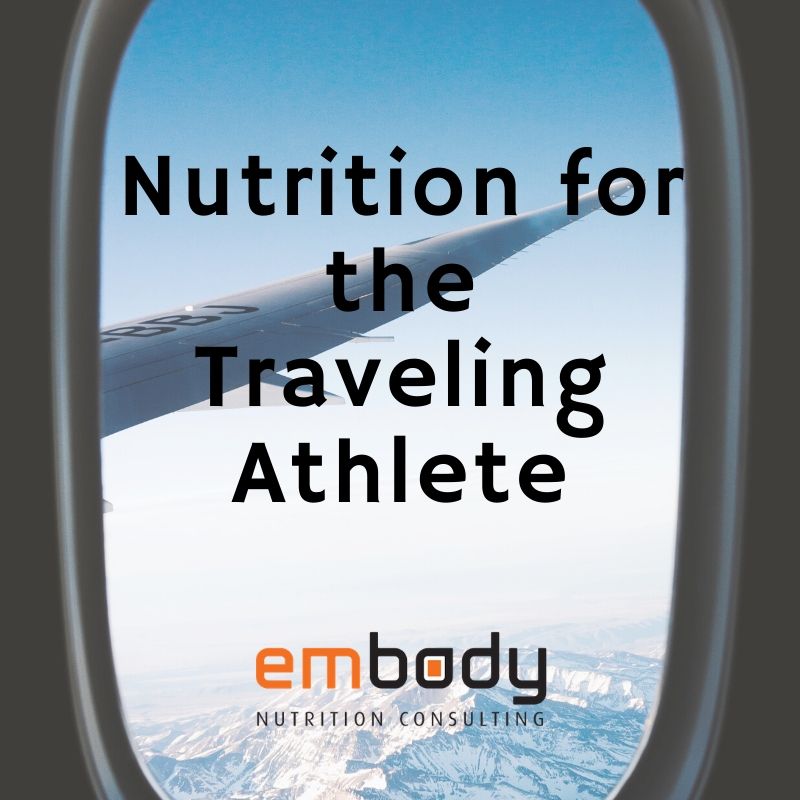If you’re a traveling athlete (OR just an active travel-loving individual), having strategies to manage travel fatigue and jet lag, and having thought ahead about your food choices can minimise the challenges of travel. This is even more important if you are competing in your sport soon after arriving. Jet lag, illness or inappropriate food choices can affect performance – so it is worth thinking ahead.
JET LAG & ZEITGEBERS
Jet lag is typically characterised by fatigue, disturbed sleep, insomnia, headaches, mood disturbance, appetite loss and gut issues. It occurs because of a difference between your body clock (circadian rhythm) and the external 24h light-dark cycle. It arises with rapid travel across time zones and its severity is influenced by the number of zones crossed, and the direction traveled. Anyone who has experienced jet lag knows just how unpleasant it can be, and for the athlete, jet lag may impact consequential training and performance.
This is where ‘zeitgebers’ come in.
These are rhythmic cues that help you to sync back up with the external environment. The most powerful of these is exposure to light – but evidence suggests that nutritional interventions such as melatonin, caffeine and meal timing/composition might help.
Melatonin
Sleep is initiated when this hormone rises. Thus, supplementing with melatonin may improve sleep and reduce the symptoms of jet lag. Melatonin is available via prescription in Australia, with doses of 2-8mg showing effect. Note that there are non-prescription forms available, though the dose contained in these is variable.
Caffeine
With a reputation for keeping fatigue at bay – it is not surprising caffeine makes the list. Approx. 200mg of caffeine can delay melatonin rhythm by 40min when taken 3h before bedtime. What’s more – 300mg of caffeine taken at 8am for 5 days has shown a more rapid resynchronization rate. You can read more about caffeine HERE.
Meal timing
If you have experienced jet lag – you’ll be familiar with feeling hungry at odd times. Meal timing has not yet been shown to effect the main body clock that exists in the brain – but it may alter some of our ‘other’ body clocks. For example, the liver clock seems to be sensitive to meal timing and meal composition.
Meal composition
Nutritional interventions that act on neurotransmitters linked with the sleep-wake cycle (e.g. serotonin – the happy hormone) might be worth considering. Dietary intake before bed has the potential to influence sleep, with some research suggesting a lower carbohydrate meal before bed may increase sleep quality. Additionally, tryptophan-rich foods might enhance natural melatonin production (seeds, meat & fish, soy products).
Even if your travel doesn’t span across time zones – considering the above may be helpful to adjust as best you can to a new environment.
FOOD ON THE GO
Even short travel can lead to poor eating – think packaged food, limited options, altered timing and boredom eating. It is a good idea to carry appropriate snacks (e.g. bars, fresh and dried fruit, nuts) to supplement intake when options are sparse – especially when energy needs are high. Check out our muesli bar review HERE.
A lack of movement, alteration of food type and timing and lower fibre intake cause wreak havoc with your bowels. Opting for high fibre foods (e.g. prunes, chia or kiwi) during long haul travel may be beneficial for susceptible athletes. If flying – pressure and dryness of cabin air increases fluid losses – so fluid intake requires attention to ensure adequacy.
Ref: Halson, S.L, Burke, L.M, Pierce, J (2018) Nutrition for Travel: From Jet Lag to Catering, Vol. 29, issue 2, pp. 228-235.

